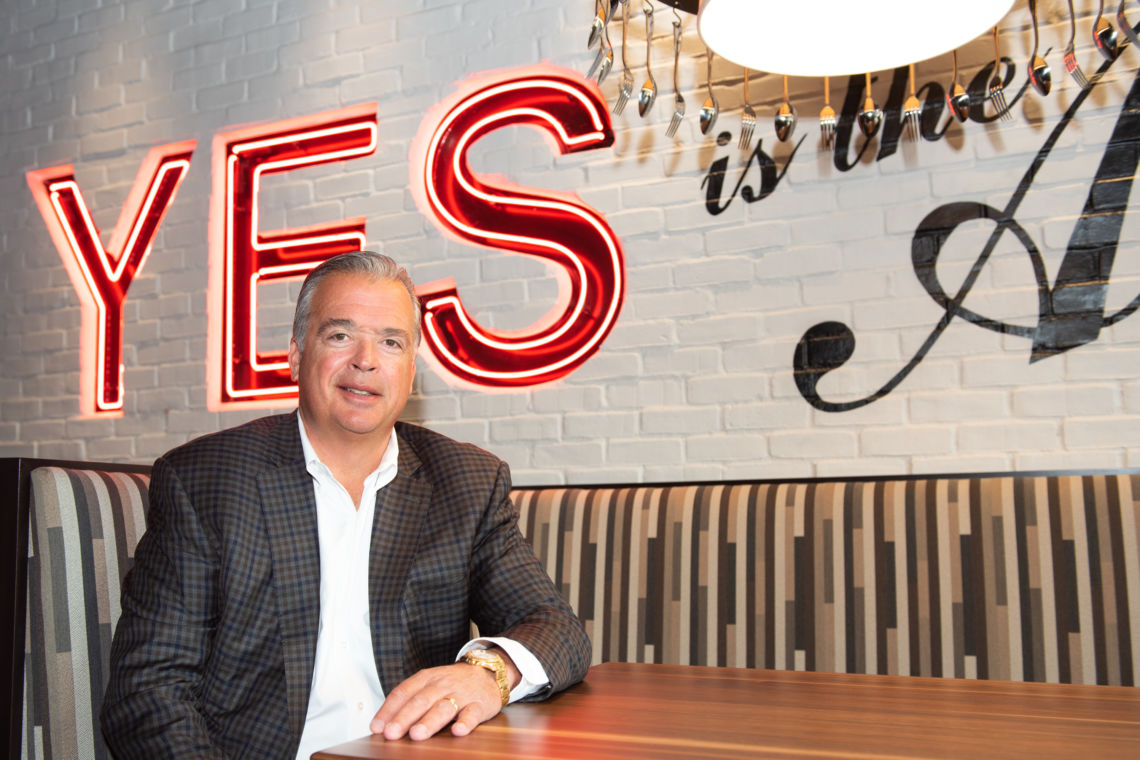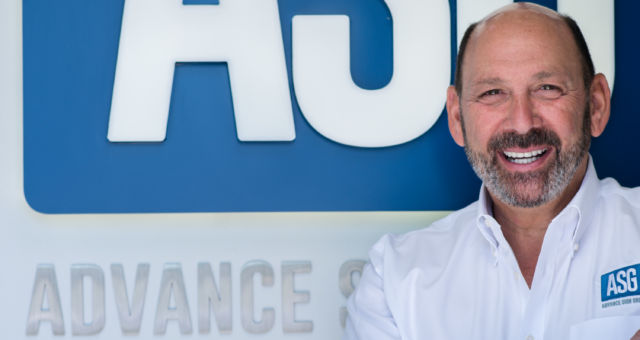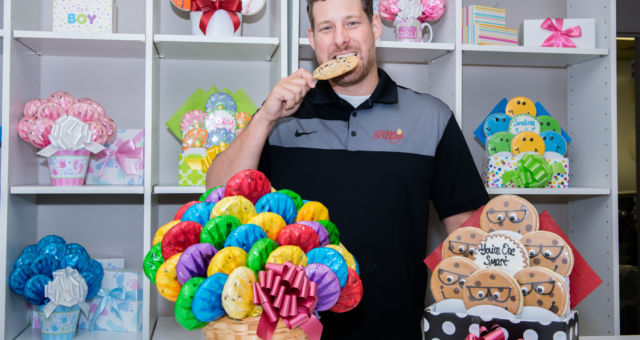What is your full name, title, and business name?
Cameron Mitchell, Cameron Mitchell Restaurants
Follow Cameron Mitchell Restaurants on Social: Facebook | Instagram | Twitter
12 Interesting Facts About Cameron Mitchell:
- He dropped out of high school but later returned and became school class president!
- He graduated almost last in his high school class (592/599) and had a 1.05 GPA.
- His first job ever was in 1980 as a dish washer at a local restaurant earning $2.65 an hour. He has been in the restaurant industry ever since.
- He now owns a $300 million empire with 55 restaurants across the country offering everything from fine dining to steakhouses to gastropubs
- He didn’t get into culinary school on his first try. He had to go back to improve some of his grades before the Culinary Institute of America would accept him into their program.
- He firmly believes in goal-setting. He wrote out his goals when he first had the idea to start his career in the restaurant industry and to this day Cameron Mitchell keeps a legal pad on his desk with all of his current goals written out.
- It was at Spagio, in Grandview, that Cameron Mitchell decided that he was going to start his own restaurant company.
- Cameron Mitchell Restaurants is built around company culture and values.
- Cameron’s American Bistro in Worthington was the first restaurant he opened.
- He has breakfast with his family every morning.
- Financial stress has been the major thing over the years that has kept him up at night.
- If he could choose any meal and drink, Cameron Mitchell would go with a steak and potatoes, plus a Tanqueray and tonic.
What’s your background and how did you get started?
My folks split up when I was 9 and we ended up living in the have-not section of Upper Arlington, that’s where I grew up. My mom was an administrative assistant and we had no money. In fact, I didn’t even have enough money for lunch. I had to work in the cafeteria at lunch so I could eat during the day in middle and high school.
I was a troubled youth. I would run away, I was a high school dropout – I dropped out of high school my sophomore year and eventually came back, but I was struggling. I ended up working for a local restaurant as a dish washer. I started in 1980 at $2.65 an hour. I was a junior in high school and was 16 so it’ll be 40 years for me in the restaurant business.
I finished last in my class in high school, 592 of 599. I went to summer school and just worked for beer money. I was living at home and struggling just trying to figure out what I wanted to do. I got suspended from work, put on probation for being lazy, being late to work and so on. Finally one Friday afternoon, I had an epiphany. There was a shift change and all of the sudden it hit me that I was going to be in the restaurant business for the rest of my life. I realized I loved this business and that night I went home and wrote up my goals. I woke my mom at 1 in the morning and told her I knew what I wanted to do for the rest of my life – I was going to be the President of a restaurant company by the time I was 35. I created a series of goals that would lead me there in this time-frame. I went to work the next morning and it was literally a 180 degree turn. I had been the laziest guy on Friday working for the man, working for beer money, going nowhere, and then on Saturday I was the hardest working guy in the kitchen, with the best attitude, working for my future. That’s really how it all started.
How did you find the confidence to go from failing classes and being last in your high school class to starting your own business?
I think I always had confidence, I just didn’t have any direction. In my case, most kids in Arlington went off to college. I didn’t know what I wanted to do. At 19 I applied to culinary school and I got turned down for admission because my high school grades were so bad. They said they liked my experience and if I could go to my local college, get A’s in math and English and then reapply, they’d accept me. I told my friends at the time, that this was going to cost me half a million dollars! They asked me what I was talking about since I was making $20k/year at the time. I told them this was going to set my career back 6 months. I knew I’d eventually be making a million dollars a year and because this was 6 months less of me making a million dollars, it would cost me half a million dollars. I think that right there illustrates the confidence I had. I always did have confidence, but I just didn’t always know what I wanted to do.

Cameron Mitchell’s “Culture of Yes” can be traced back to a restaurant turning down his 4-year-old sons milkshake request.
A lot of people look at a successful entrepreneur and they don’t realize all the hard work that went into it. Talk about the hustle and what goes on behind the scenes as an entrepreneur.
In culinary school, I knew I wanted to work in Manhattan. I lived in Poughkeepsie in Upstate New York and it was an hour and 45 minute drive each way into the city. Every Saturday and Sunday I’d get up at 6am and drive down to Manhattan. I’d work until 6, 7, 8pm and then I’d drive home. I couldn’t stay in the city, I had nowhere to stay because I didn’t know anybody. So I’d go home and then get up Sunday morning, do it all over again and come back Sunday evening.
At one point in time I went over 100 days straight without a day off between class and work and it was very hard. Being a great restauranteur is difficult and being a successful entrepreneur is extremely difficult. You just have to continue to push every single day. Having my goals set like I did was extremely powerful for me. I knew what I wanted to do, I knew where I wanted to go, and everything I did was with those goals in mind. Having those mapped out got me through a lot of adversity. Even today, on my desk, I’ve got my legal pad with my 4th quarter goals. I’m in the 4th quarter of my career so I have to have my 4th quarter goals. I’ve been goal setting all my life and that’s given me a lot of strength to pursue.
What are some of those 4th quarter goals?
Well, I’ve celebrated 40 years in the restaurant business. We just celebrated 25 years with Cameron Mitchell Restaurants. My wife and I will celebrate our 25 year anniversary next year. My youngest daughter graduates from high school in 2021.
I’m 55, will be 56 this summer, and I want to start moving into a chairman’s role in the company and focus on our two S’s: Stewardship and Strategy. I want to be the Chief Strategy Officer for the company and Chief Steward. I want to cut back on the heavy lifting, not do as much traveling, and really just focus on giving back to our community and industry. We’ve got a Columbus Community College project that we’re working on and our Budd Dairy Food Hall, plus some other entrepreneurial things we’re working on. My goal is to just generally slow down a little bit and tend to the company.
Do you think you’ll be able to slow down?
I think so… I hope so! I’m doing some things and choreographing some things in the company to allow me to do that, so as long as those come to fruition, I’ll be ok.

Cameron Mitchell is a firm believer in putting pen to paper and setting goals.
What were you doing within the restaurant industry in Columbus when you moved back after culinary school?
After culinary school, it was still 6 or 7 years before I started Cameron Mitchell Restaurants. I came back to Columbus and the 55 Restaurant Group had one white tablecloth restaurant downtown at the time. It was owned by some local wealthy businessmen, they hired an operating partner who was in the restaurant business to help them. I got on board with them and I opened up the second restaurant as Sous-Chef. I got promoted 6 months later to Executive Chef at the downtown restaurant. Then I became the General Manager of that restaurant and shortly after, I got promoted to General Manager of the bigger restaurant. A few more years in, at 26, I got promoted to Operations Manager of all four restaurants.
I grew that company for a couple more years and had 6 restaurants with them as Operations Manager. Then I started to hit my head on the ceiling. My boss was a great guy and a good mentor to me, but he was a micromanager and the company was starting to outgrow him. I started to see what was going on with some of the great multi-concept operators around the country and I was getting frustrated. These wealthy business owners in Columbus, they really had no interest in growing the business, they were just putting restaurants in their developments and so forth.
I was at a local restaurant, Spagio, in Grandview, on a Friday night. The dinner rush was over but the restaurant was still packed. Chef Huber was working the dining room and I was just watching him. I remember it hit me right then like a ton of bricks. I had always wanted to be the President of a restaurant company. I thought I was working my way towards that in this company but I realized right then and there that I was going to start my own restaurant company.
I left 5 weeks later, July 11 of 1992, with a legal pad, a couple thousand bucks, and a one bedroom apartment. That’s when I started going about the course of building Cameron Mitchell Restaurants. I wrote out our company culture and values in the first 30 days. I wanted to build a company based on culture and values. I wanted to build a company that was going to be around for 30, 40, 50, 60, 100 years. In order to do that you need to have values in your organization, so I had to get those fine-tuned. It took me about a month of reading and reflecting and writing and re-writing and I finally got it just right. Then I set about the course of building a restaurant company based on those culture and values.
I worked for about four months on a project downtown over the holiday of 1992. That deal fell through, the landlord went bankrupt and I had to start all over, give all my partners their checks back. The bank repossessed that building and I had to scramble to find a new site, which was Cameron’s in Worthington at 161. I finally got that deal closed in March of 1993. By then, I had given up my apartment, moved into my mom’s condo. She had gotten re-married and moved down to Florida. I was down to my last $70 and could barely buy groceries. I finally closed that deal and I was able to write myself a check in early March of 1993 for $7,000 I had spent on copies and business plans and charged it off to administrative expenses. I lived off that $7,000 until we opened October 5th of 1993. We have built about 90 restaurants since then.
What’s your advice for someone wanting to take the leap and start a business when they have a great idea?
First of all, especially young people today, every college and university is teaching entrepreneurship these days. That’s fine, but after graduating college you have no business experience and starting a business after that can be very difficult. First piece of advice is to get some good business experience. I think most entrepreneurs see a niche in the marketplace where they’re already working. I think that’s the niche I saw. I saw that Columbus was a meat and potatoes town and we needed a multi-concept restaurant company. That became the genesis for our company and the birth of our company. I had a lot of experience, I didn’t leave until I was 28.
I think you also need to do a real solid gut check and make sure you’re willing to do the grunt work. Being an entrepreneur and certainly starting out, you’re swimming upstream and all inertia is against you. There are many, many, many dark days and trials and tribulations along the way and that’s where most people fail. They’re not able to persevere and get through some of that sort of thing. I fear failure but I also don’t believe that failure is an option. I can get around anything by changing strategy, changing direction, digging through the problem, over the problem, going right through the problem. You have to have tenacity. I’m a believer in my perseverance. That’s where I think the gut check comes in. It’s also nature vs. nurture. If you look back at my life, I’ve been an entrepreneur since I was a little kid. It all went back to the lemonade stand. It’s in my blood. I’ve been a leader. Whether it be as my little league football team captain, class president of my high school, or anything, I’ve always moved into a leadership role. I think there’s a lot of nature vs. nurture.

How do you get employees to buy into the overall culture at CMR?
Within our company culture and values, our number one value is that the employees come first. We’re a restaurant company built by its people, for its people. We’re not owned by the bank, we’re not owned by Wall Street, we’re not owned by a private equity firm. Yes, we have investors, but those investors get a good return because of the way that we operate our business and take care of our people.
I also think our people live by the culture and understand the culture. It works very well for them. All anyone has to do is look to their right and look to their left and they see a story of someone who built their career with our company from the beginning. We’ve had hundreds of CMR marriages and babies along the way. I’ve seen it happen so many times and people tell me this is the last job they ever want to have. When you can create that kind of environment, people buy into it and if they don’t, they just don’t work here. You can’t work and survive in this company if you don’t buy into the company culture and value.
You said that if employees don’t buy into the culture, they just don’t work there. Many entrepreneurs struggle with the fact that sometimes employees just may not be the right fit. How do you know someone isn’t the right fit and how do you have the confidence to part ways with that person?
Sometimes they’re not the right fit, but it’s just because they’re in the wrong seat, so we move them to another seat on the bus. That has happened quite often. We very rarely fire people. I always tell people that if you meet someone that got fired from Cameron Mitchell Restaurants you outta pat them on the back because they must have worked really hard at it. We’re in the success business, not the failure business. We want our people to succeed so we go to great lengths to coach them and support them and help them succeed. Eventually, at some point in time if they can’t, then we have to part ways, but there’s a long time period between the time we think that or are concerned about that and the time it actually happens. As long as someone is improving and growing along the way, then we’ll work with them. That’s the key – to have faith in people.
Are you more of a morning person or a night owl?
Neither. Today I’m just plain tired! I’m usually in bed between 10-11pm and I’m up every day around 6:30 or 7am. If I could sleep in, I would, but I’m getting old so I can’t sleep past that. Plus we still have high school kids, so they’re up in the morning getting ready for school. We have breakfast together every day. I’m not the 4:30/5, get to work at 6am kind of guy. That’s just not for me, but I’m also not a night owl either. I try to get my solid 8 hours.
What’s something that keeps you up at night in regards to the business?
Financial stress. Occasionally there will be problems within the business that aren’t financial, but there’s been many nights where my wife has woken up in the middle of the night or in the morning and I’m down at my desk in shorts and a t-shirt working on my calculator, working on my legal pad planning, researching and so-forth because I’m stressed out. As we’ve built the company along the way, financial stress has always been the number one problem. The company has always done well financially and profitably, but as we’ve grown, the restaurant business is very cash intensive. It takes a lot of cash to build these restaurants. A lot of times we’ve over-expanded and we’re short on cash so those are the times that I really feel the stress.
What’s your favorite cocktail?
Tanqueray and Tonic. I’m not that diverse when it comes to alcohol and drinking. I like my Tanqueray and tonic. I’m pretty simple that way.
If you could have any meal from any of your restaurants, what would it be?
I’m a meat and potatoes guy so I’d pick any good steak and baked potato or mashed potato.
How important is it for an entrepreneur to find a good CPA, to have a good attorney. How important has that been for you?
Very important. I wanted to build a company based on culture and values. Part of that is business integrity. I wanted to hire top legal and financial representation. I hired a young gal 22 years ago that became our CFO and she’s been our CFO ever since. She does a phenomenal job and everything is always pristine and perfect. I like that because I enjoy sleeping at night. If anyone ever wants to audit our books, all we do is simply say here you go and it’s right there. Now we have our own in-house General Counsel who has been our attorney for the past 12 years, so we’ve always had good legal representation. I think that’s all part of integrity and part of quality and part of running a good business.
If Cameron Mitchell had just graduated from Upper Arlington high school in 2019, what business would he start today?
Everyone says the restaurant business is so tough and so brutal. I guess I would have loved to be a real-estate developer maybe or something in the financial markets. I always say though that the restaurant business found me, I didn’t find it. I often think about if my first job in high school had been sweeping car lots. Would I own a bunch of car dealerships today? I think probably, I would. I fell in love with the restaurant business but I just happened to get a job as a dish washer in a restaurant and that’s how it all started.
What’s one piece of advice you would give to aspiring entrepreneurs?
There are never any short cuts to success. You have to be willing to pay the price to do what you do. I always compared myself to one of those toys that you punch and it falls down but then pops right back up. God knows, thousands of times I’ve been punched down, but I always get right back up. You have to have that tenacity in order to be successful.





